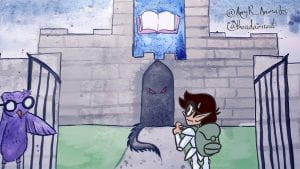The students come at last to the place where the object of their quest is hidden. This point in the journey is not the point of final assessment though (that would be the ‘ordeal’, see stage viii), nor is it the most difficult part of the unit, rather it is the lead up to the assessments, where they learn by combining the skills and knowledge gained so far and applying it in their own work. In terms of teaching and learning, this stage of the journey might be fairly short, and primarily focused on ensuring that the students are sufficiently prepared and motivated for this first major step.
Diagnostic questions for stage vii):
- This stage is all about preparation for what comes after. What will the students need to do in order to be successful in the supreme ordeal? What knowledge will they need to have? What skills should they have developed? What tools will they need to use? What strategies will they need to adopt? – and how are you ensuring that the students are sufficiently prepared for this? What learning activities are in place to give them as good as possible a chance to be successful?
- Is there anything that is in place that will allow the students to get feedback and/or judge their own progress before they face the supreme ordeal (i.e. the final assessment(s) of the unit)? This could be an official assessment, the opportunity to sit a mock paper or the opportunity to submit a draft of an essay, for example.
- How much is this stage about combining skills and knowledge that students learned previously, but separately? How is it managed that students understand this process of collation, application and synthesis?
